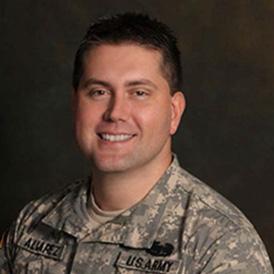
Luis Alvarez, PhD '09
Lt. Col. Luis M. Alvarez, Course 20 PhD ‘09 had always been interested in science. From his South Florida youth filled with “tinkering with things and lighting things on fire,” science has always played an important role in his life. However, he simultaneously felt the need to be more than a scientist. Eighteen year old Alvarez desired to “conquer the Spartan aspect of the military with the Athenian aspect of academia.” To that end, he attended West Point, earned his master’s in Chemical Engineering at MIT, and was subsequently stationed in Ft. Hood, Texas, South Korea, and Iraq.
It was while in Baghdad that Alvarez became deeply interested in novel technologies that could help people in conflict zones. He knew many people who were injured and even killed in combat. Alvarez remarks that these experiences, “changed my view on what I wanted to dedicate the rest of my life to…I want to devote my time to work out problems to address the injuries that people suffer in wartime. Not just military people, but anybody caught up in conflict.” It was this desire that led him to pursue research in developing novel scaffolds for bone regeneration.
Currently when a bone is fractured, bone void fillers are placed into the tissue bare. There is no covering on the ceramic structure and one simply hopes that stem cells will attach and grow inside the filler to strengthen the bone. Yet, there is nothing inducing this response. Alvarez was interested in actively attracting and promoting stem cell growth on these implants. Thus for his doctoral thesis project, coadvised by Professor Linda Griffith and Dr. Richard Lee of Brigham and Women’s Hospital, he engineered proteins to bind to tricalcium phosphate, a common bone void filler material, and fused those proteins to growth factors. Therefore, these implants can be literally dipped in growth factor solution and have growth factors “decorate the surface.” When seeded with bone marrow, stem cells should be induced to grow and proliferate on the implant. This work can not only help soldiers injured in the line of duty, but also people who suffer fractures and other bone damage at home.
Upon completion of his degree, Alvarez received a Career Development Award from the Department of Defense which allowed him to start a lab at the National Cancer Institute in Frederick, Maryland pursuing this project further. He hopes to study these proteins and implants more deeply and soon test them in animals. Working for the Department of Defense, there is a great deal of incentive to move research forward to clinical applications. Alvarez hopes that when his military service is completed in the next three years, he can “start a small startup to push the bone implant project forward. That would be very exciting.” Until that point, he will continue leading the Regenerative Biology Research Group at NCI and improving the lives of soldiers and civilian the world over.
More information on Lt. Col. Alvarez and the Regenerative Biology Research Group can be found at: http://www.regenbiogroup.org/


